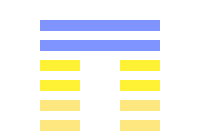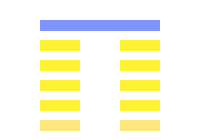20.3.4.5.6 (20 > 62)

20.3.4.5.6 (20 > 62) - THE KWÂN HEXAGRAM.
- 3. The third line, divided, shows one looking at (the course of) his own life, to advance or recede (accordingly).
- 4. The fourth line, divided, shows one contemplating the glory of the kingdom. It will be advantageous for him, being such as he is, (to seek) to be a guest of the king.
- 5. The fifth line, undivided, shows its subject contemplating his own life(-course). A superior man, he will (thus) fall into no error.
- 6. The sixth line, undivided, shows its subject contemplating his character to see if it be indeed that of a superior man. He will not fall into error.
20.3.4.5.6 (20 > 62) - Accepting the judgment
One gathers their ideas to have the strength to accept their destiny.
Bing DeepL Google Yandex20.3.4.5.6 (20 > 62) - Accepting the judgment
One gathers their ideas to have the strength to accept their destiny.
Bing DeepL Google Yandex20.3.4.5.6 (20 > 62) - Kwèn, la contemplation
Kwèn : 1. Regarder, contempler, regard ; 2. Apparence extérieure, maintien ; 3. Gravité, dignité.
- 3. Regarder sa propre vie (pour diriger) ses actes (ses allées et venues), (afin de ne pas perdre la voie droite.).
-
4. Venir contempler la majesté de l’empire ; être un heureux hôte du Souverain.
(Se dit d’)un hôte illustre.
Note. Expression consacrée pour dire : faire visite au souverain, en parlant d’un chef féodal. -
5. Contempler sa propre vie. Le Kiun-tze est par là sans reproche.
Regarder le peuple. - 6. Contempler sa vie ; le Kiun-tze est par là sans reproche.
20.3.4.5.6 (20 > 62) - Accepter le jugement
On rassemble ses idées pour avoir la force d'accepter son destin.
Bing DeepL Google Yandex20.3.4.5.6 (20 > 62) - Tekintet
- 3. Tanulni akar.
- 4. Megkéri a legfiatalabbat, hogy ne kövessen el meggondolatlanságot, mielőtt konzultálna a legtapasztaltabbakkal.
- 5. Illetékes személy után néz.
- 6. Nem akarja látni a nehézségeket.
The trigrams
The trigrams are combinations of three yin and yang lines. The three bottom lines of the hexagram form the lower trigram and represent the inner situation. The three top lines form the upper trigram and represent the outer situation.
Upper trigram: The wind The thunder


Lower trigram: The earth The mountain


The formation: 20
What is already there

20 - THE KWÂN HEXAGRAM.
Kwan shows (how he whom it represents should be like) the worshipper who has washed his hands, but not (yet) presented his offerings ;---with sincerity and an appearance of dignity (commanding reverent regard).
Bing DeepL Google Yandex20 - Kwèn, la contemplation
Kwèn : 1. Regarder, contempler, regard ; 2. Apparence extérieure, maintien ; 3. Gravité, dignité.
Texte
Maintien, gravité comme celle de quelqu’un qui est purifié et prêt à offrir le sacrifice et ne fait point l’offrande ; il est plein de droiture, de dignité sévère.
Symbolisme
Vent passant, soufflant sur la terre. Les anciens rois observaient (les caractères) des lieux et du peuple pour établir leur enseignement.
Le grand observateur (figuré par le trigramme du vent) se tient en haut lieu; l’homme bienveillant et conciliant (représenté par le trigramme de la terre) se tient au milieu pour inspecter, contempler le monde.
Commentaire
Les inférieurs le contemplent et se modèlent sur lui. Contemplant la voie spirituelle du ciel et les saisons (se succédant) sans changement, le saint s’y conforme et établit en conséquence son enseignement.

20.3 (20 > 53) - THE KWÂN HEXAGRAM.
The third line, divided, shows one looking at (the course of) his own life, to advance or recede (accordingly).
Bing DeepL Google Yandex20.3 (20 > 53) - Kwèn, la contemplation
Kwèn : 1. Regarder, contempler, regard ; 2. Apparence extérieure, maintien ; 3. Gravité, dignité.
Regarder sa propre vie (pour diriger) ses actes (ses allées et venues), (afin de ne pas perdre la voie droite.).
Bing DeepL Google Yandex
20.4 (20 > 12) - THE KWÂN HEXAGRAM.
The fourth line, divided, shows one contemplating the glory of the kingdom. It will be advantageous for him, being such as he is, (to seek) to be a guest of the king.
Bing DeepL Google Yandex20.4 (20 > 12) - Taming the impetuosity of the newcomers
One asks the youngest not to be reckless in making decisions without consulting the most experienced.
Bing DeepL Google Yandex20.4 (20 > 12) - Taming the impetuosity of the newcomers
One asks the youngest not to be reckless in making decisions without consulting the most experienced.
Bing DeepL Google Yandex20.4 (20 > 12) - Kwèn, la contemplation
Kwèn : 1. Regarder, contempler, regard ; 2. Apparence extérieure, maintien ; 3. Gravité, dignité.
Venir contempler la majesté de l’empire ; être un heureux hôte du Souverain.
(Se dit d’)un hôte illustre.
Note. Expression consacrée pour dire : faire visite au souverain, en parlant d’un chef féodal.
20.4 (20 > 12) - Dompter l'impétuosité des nouveaux venus
On demande aux plus jeunes de ne pas commettre d'imprudences en prenant des décisions sans consulter les plus expérimentés.
Bing DeepL Google Yandex20.4 (20 > 12) - Tekintet
Megkéri a legfiatalabbat, hogy ne kövessen el meggondolatlanságot, mielőtt konzultálna a legtapasztaltabbakkal.
Bing DeepL Google Yandex
20.5 (20 > 23) - THE KWÂN HEXAGRAM.
The fifth line, undivided, shows its subject contemplating his own life(-course). A superior man, he will (thus) fall into no error.
Bing DeepL Google Yandex20.5 (20 > 23) - Refreshing the memory
One explains to others what they already know.
Bing DeepL Google Yandex20.5 (20 > 23) - Refreshing the memory
One explains to others what they already know.
Bing DeepL Google Yandex20.5 (20 > 23) - Kwèn, la contemplation
Kwèn : 1. Regarder, contempler, regard ; 2. Apparence extérieure, maintien ; 3. Gravité, dignité.
Contempler sa propre vie. Le Kiun-tze est par là sans reproche.
Regarder le peuple.
20.5 (20 > 23) - Rafraîchir la mémoire
On explique aux autres ce qu'ils savent déjà.
Bing DeepL Google Yandex
20.6 (20 > 8) - THE KWÂN HEXAGRAM.
The sixth line, undivided, shows its subject contemplating his character to see if it be indeed that of a superior man. He will not fall into error.
Bing DeepL Google Yandex20.6 (20 > 8) - Taking care of oneself
One doesn't want to see any difficulties.
Bing DeepL Google Yandex20.6 (20 > 8) - Taking care of oneself
One doesn't want to see any difficulties.
Bing DeepL Google Yandex20.6 (20 > 8) - Kwèn, la contemplation
Kwèn : 1. Regarder, contempler, regard ; 2. Apparence extérieure, maintien ; 3. Gravité, dignité.
Contempler sa vie ; le Kiun-tze est par là sans reproche.
Bing DeepL Google Yandex20.6 (20 > 8) - Prendre soin de sa personne
On ne veut voir aucune difficulté.
Bing DeepL Google YandexIn the making: 62
What is poised to happen

62 - THE HSIÂO KWO HEXAGRAM.
Hsiâo Kwo indicates that (in the circumstances which it implies) there will be progress and attainment. But it will be advantageous to be firm and correct. (What the name denotes) may be done in small affairs, but not in great affairs. (It is like) the notes that come down from a bird on the wing ;---to descend is better than to ascend. There will (in this way) be great good fortune.
Bing DeepL Google Yandex62 - Siao kouoh, la prépondérance du petit
Siaō kouoh : (petit, peu, ou des petits), avancement, manquement, défaut, avancer, dépasser, passer à côté, transgresser.
Siao kouo « petite supériorité (ou des petits) ». Dans tous leurs stades de développement, les petits sont capables de petites choses et pas de grandes. C’est comme le son laissé par le passage d’un oiseau volant, il ne peut pas grandir (s’élever), mais uniquement diminuer (ou baisser) 3.
3 Suite et opposition au n° 28
Texte
Petit avancement. En toute la série de ses actes, le petit peut faire de petites choses, mais point de grandes. C’est comme le bruit fait par le passage d’un oiseau, il ne peut pas grandir, mais seulement diminuer, baisser (Ier sens).
Symbolisme
Cet hexagramme représente le tonnerre au-dessus d’une montagne. Kouoh est manquement. — Le sage, dans ses actions ordinaires, manque par respect insuffisant. — En cas de deuil, on manque quant aux vêtements ; dans les dépenses journalières, on manque par rapport à l’économie.
Commentaire
Si en avançant le petit agit selon les circonstances et qu’il garde le juste milieu, les petites affaires qu’il fera réussiront. Le fort qui perd sa dignité et ne garde pas le milieu ne peut plus, par cela même, rien faire de grand. Il est représenté ici sous la figure de l’oiseau volant ; le bruit de son vol ne peut s’élever, mais uniquement diminuer. — Le grand résiste, le petit cède.
The nuclear hexagram: 23.2.3.4.5.6 (23 > 28)
The nuclear hexagram is the association of the two inner trigrams (lines 2,3,4 and 3,4,5). It represents the root, or the origin of the situation.

23.2.3.4.5.6 (23 > 28) - THE PO HEXAGRAM
- 2. The second line, divided, shows one overthrowing the couch by injuring its frame. (The injury will go on to) the destruction of (all) firm correctness, and there will be evil.
- 3. The third line, divided, shows its subject among the overthrowers; but there will be no error.
- 4. The fourth line, divided, shows its subject having overthrown the couch, and (going to injure) the skin (of him who lies on it). There will be evil.
- 5. The fifth line, divided, shows (its subject leading on the others like) a string of fishes, and (obtaining for them) the favour that lights on the inmates of the palace. There will be advantage in every way.
- 6. The topmost line, undivided, shows its subject (as) a great fruit which has not been eaten. The superior man finds (the people again) as a chariot carrying him. The small men (by their course) overthrow their own dwellings.
23.2.3.4.5.6 (23 > 28) - Faking benevolence
One likes to make others believe that they will have no trouble making themselves heard.
Bing DeepL Google Yandex23.2.3.4.5.6 (23 > 28) - Faking benevolence
One likes to make others believe that they will have no trouble making themselves heard.
Bing DeepL Google Yandex23.2.3.4.5.6 (23 > 28) - Poh, l’écroulement
Poh : opprimer, renverser, traiter durement.
-
2. [i]Id. (Poh)[i], renverser son lit en en brisant la forme ; ruine, issue destructive. C’est celui qui se perd lui-même en perdant ses auxiliaires ; un roi, ses ministres ; un grand, ses employés et amis. (Dicton.)
Il n’aura pas de compagnons.
C’est la ruine s’étendant, gagnant le haut. - 3. Renverser, faire crouler quelque chose sans suite regrettable. C’est quand on le fait légitimement et pour bonnes raisons. C’est que cela atteint également grands et petits (ou abandonne).
-
4. Renverser son lit en s’écorchant, en se nuisant à soi-même, destruction certaine, calamité proche.
Suite de la gradation, en renversant on se blesse -
5. Le prince généreux envers les gens du palais (litt.(/i] : qui enfile des poissons pour en faire présent), en retirera des avantages certains.
Peut-être devrait-on admettre déjà ici l’élément figuratif et symbolique, et voir dans l’hexagramme la figure du prince (ligne pleine supérieure) au-dessus de ses officiers rangés comme des poissons séchés et traduire : avoir des officiers comme des poissons enfilés. Alors, il s’agirait de [i]p’o, gens du palais. -
6. Fruit tout formé qu’on ne mange pas (bien acquis qui se détruit). Le sage, l’homme supérieur conquiert la terre (ou acquiert un char, le peuple qui le porte sur ses bras) ; l’homme bas et vulgaire fait crouler (poh) jusqu’à sa demeure (le fruit formé qu’il ne peut manger).
Il ne pourra plus en user.
23.2.3.4.5.6 (23 > 28) - Feindre la bienveillance
On se plaît à faire croire aux autres qu'ils n'auront aucun mal à se faire entendre.
Bing DeepL Google Yandex23.2.3.4.5.6 (23 > 28) - Lepusztulás
- 2. Támasz, amire nem lehet számítani többé.
- 3. Nem törődik a többiekkel többé.
- 4. Nem akar elviselni többé.
- 5. Látja mi nem működik.
- 6. Elfogadja a veszteséget. Támogatást és lehetőséget kap.
Ruler
The starting situation

20.6 (20 > 8) - THE KWÂN HEXAGRAM.
The sixth line, undivided, shows its subject contemplating his character to see if it be indeed that of a superior man. He will not fall into error.
Bing DeepL Google Yandex20.6 (20 > 8) - Taking care of oneself
One doesn't want to see any difficulties.
Bing DeepL Google Yandex20.6 (20 > 8) - Taking care of oneself
One doesn't want to see any difficulties.
Bing DeepL Google Yandex20.6 (20 > 8) - Kwèn, la contemplation
Kwèn : 1. Regarder, contempler, regard ; 2. Apparence extérieure, maintien ; 3. Gravité, dignité.
Contempler sa vie ; le Kiun-tze est par là sans reproche.
Bing DeepL Google Yandex20.6 (20 > 8) - Prendre soin de sa personne
On ne veut voir aucune difficulté.
Bing DeepL Google YandexCorrection
The direction where the ruler is going to bend

20.3.4.5 (20 > 56) - THE KWÂN HEXAGRAM.
- 3. The third line, divided, shows one looking at (the course of) his own life, to advance or recede (accordingly).
- 4. The fourth line, divided, shows one contemplating the glory of the kingdom. It will be advantageous for him, being such as he is, (to seek) to be a guest of the king.
- 5. The fifth line, undivided, shows its subject contemplating his own life(-course). A superior man, he will (thus) fall into no error.
20.3.4.5 (20 > 56) - Seeking an expert advice
One relies on the judgment of those who know the situation without being involved.
Bing DeepL Google Yandex20.3.4.5 (20 > 56) - Seeking an expert advice
One relies on the judgment of those who know the situation without being involved.
Bing DeepL Google Yandex20.3.4.5 (20 > 56) - Kwèn, la contemplation
Kwèn : 1. Regarder, contempler, regard ; 2. Apparence extérieure, maintien ; 3. Gravité, dignité.
- 3. Regarder sa propre vie (pour diriger) ses actes (ses allées et venues), (afin de ne pas perdre la voie droite.).
-
4. Venir contempler la majesté de l’empire ; être un heureux hôte du Souverain.
(Se dit d’)un hôte illustre.
Note. Expression consacrée pour dire : faire visite au souverain, en parlant d’un chef féodal. -
5. Contempler sa propre vie. Le Kiun-tze est par là sans reproche.
Regarder le peuple.
20.3.4.5 (20 > 56) - Demander l'avis d'un expert
On s'en remet au jugement de ceux qui connaissent la situation sans pour autant y être mêlés.
Bing DeepL Google Yandex20.3.4.5 (20 > 56) - Tekintet
- 3. Tanulni akar.
- 4. Megkéri a legfiatalabbat, hogy ne kövessen el meggondolatlanságot, mielőtt konzultálna a legtapasztaltabbakkal.
- 5. Illetékes személy után néz.

